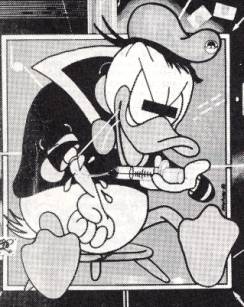
Sydnordisk
Akademi for Donaldisme & Universiteit voor Hooge en Algemeene Donaldismus te
Annedam
Ducks
on drugs?
af
dr. Johaan Hop van de Haavelouw, ekspert i anatid pharma-toksikologi og gæsteprofessor
på SAD fra Universiteit voor Hooge en Algemeene Donaldismus te Annedam (UHADA)
2005

Just
before my beginning as a guest professor here at South-Nordic Academy of
Donaldism, a graduation - or rather, an attempt to graduate - as a Master of
Donaldism (M.D.) took place in these learned halls. The candidate, Mr. Palle
Damgaard, had most fruitfully brought to attention the disturbing fact, that
sudden fainting seems to be rather common in Duckburg, at least according to
some Donaldistic reporters and publications, and especially for two well-known
members of the Duck Family: Donald and his Uncle Scrooge.
Young Mr. Damgaard cautiously suggested atmospherical pollution in Duckburg in general or within the money bin of Mr. McDuck in particular as potential explanations for this peculiar phenomenon, but in spite of his most thorough and systematic investigation he still found it uncertain to conclude anything for sure - maybe due to exam nerves and too much academic humility? No such restraints, however, seemed to trouble his evaluators and audience, as several - often quite creative and internally conflicting - theories of explanation were given after Damgaard’s presentation.
Still,
the most obvious reason for the numerous faintings in the Duck Family has to my
surprise been neglected. Maybe because it is also the perhaps most unpleasant
explanation of them all. Nevertheless, when you look at the facts scientifically,
there is no avoiding the conclusion: The Ducks are on drugs!
I present for you exhibit 1 (the picture below): One beautiful day in Duckburg, Donald is taking a stroll downtown together with his nephews, when all of a sudden, he starts feeling dizzy, his legs begin to shake and it blackens before his eyes. Luckily, Donald’s nephews are prepared, they know the symptoms, and they catch their uncle before he hits the pavement. They know what is happening, and so does their uncle, who tells them: »There is only one thing to do!« »What?«, the nephews ask, and the answer is written on the wall: »DRINK GURGLEURP!« (“Brusevand” på dansk, red.).
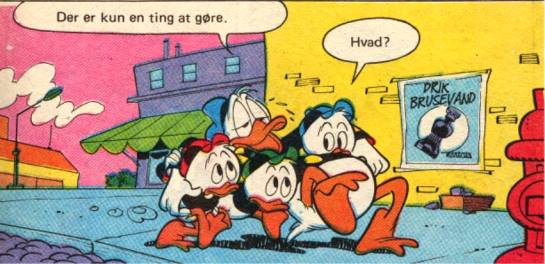
Drink
Gurgleurp?? Now of
course, the presented reading of the episode is completely false. If any of you
are familiar with the actual story
from which the scene is taken (TL 1071), you will know, that Donald’s fainting
is due to a chock provoked by a humongous inflation on vegetable prices, and the
appearance of the Gurgleurp®
poster in the background is totally coincidental. Or is it?

Donald is half unconscious, apathetic and only barely in contact with the world around him. His head is spinning, and by the look on his face, he is having a bad trip. Huey, Dewey and Louie are looking concerned with good reason.
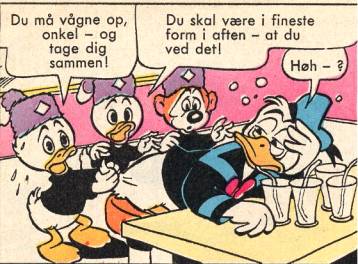
What the heck is going on with Uncle Donald? Officially, the sad condition of Donald is caused by the consumption of at least four glasses of Gurgleurp®, apparently an innocent soft-drink product with high contents of sugar and carbondioxide. But who ever heard of an innocent soft drink that could put a grown Duck to a state like this? The consumption of Gurgleurp® has not just made Donald noxious. Not only is he evidently mentally influenced and losing touch with reality. His entire body strength has left him.
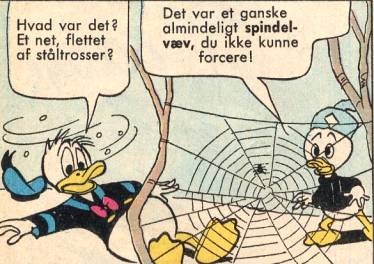

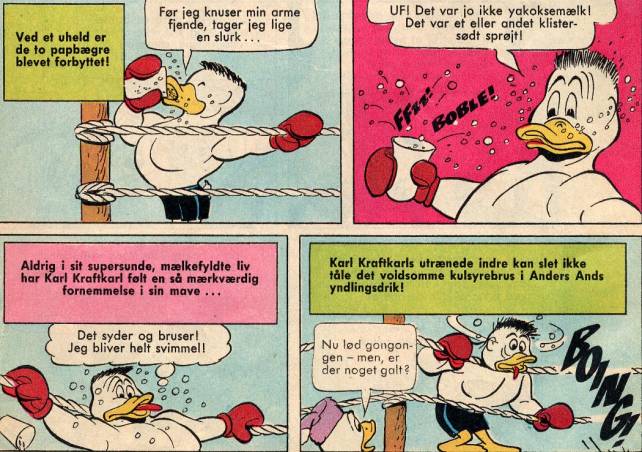
Now, this whole incident could be put aside as a curiosity, if it wasn’t because of the fact, that Donald’s addiction to Gurgleurp® is by no means a one-time mishap. His unhealthy longing for the sweet drink, and his physical uncomfortability, irritation and lack of concentration when he doesn’t get it, has been proven only too often since 1964. I am sure, all the young students present will recall the revealing episodes during Donald’s trip to the Island of Myths, reported less than two years ago (bl.a. AA 36/2003).
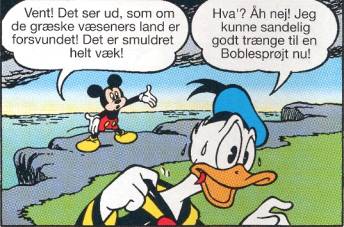
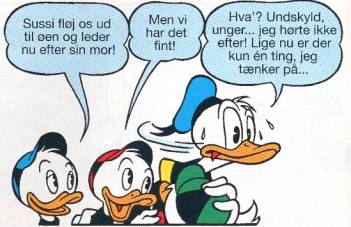
Donald Duck is on to something. And by the looks of it, it ain’t no good. Of course, I am not the first one to bring this matter to the attention of Donaldistic scholars. My esteemed German colleague, dr. Michael Machatschke (former president of D.O.N.A.L.D.), addressed the whole Gurgleurp-scandal as early as 1983. According to Machatschke, sugar and carbondioxide alone couldn’t be the explanation of the effect of Gurgleurp: »Rather, it seems as if we are dealing with substances, that are usually not connected with lemonade, nor should they BE connected with lemonade! Only more so, as Gurgleurp seems to contain some sort of drug or narcotics (...) which are leading to addiction.« Indeed, dr. Machatschke dared not even reject the repellent thought, that the manufacturers of Gurgleurp® on purpose should have added some kind of illegal ingredients to their product, just as unscrupulous cola producers of our world experimented with cocaine some years back (in the cola, that is!). However, Michael Machatschke found it hard to identify the unknown drug in Gurgleurp® as cocaine, which usually gives the user a strength-enhancing effect, most popular in recent years among football players and pro-cyclists. This is certainly not the effect on Donald, who cannot even break through the web of a spider. In his dissertation of 1983, dr. Machatschke suggested alcohol to be the most likely answer to the secret of Gurgleurp® - and hence to Donald’s motion problems.
In
my opinion, the Donaldistic sources point to a much more plausible explanation.
Once again, our man on the scene is Carl Barks. In 1962, he brought to our
knowledge yet another fantastic documentary with huge importance for our
understanding of the Anatide universe: The tale of the nutmeg tea (US
39-02). After a long day at the money bin counting coins, old Scrooge McDuck
begins to feel fatigue, and he decides that it is time for the high light of the
day; his tea break. A cup of fresh-made nutmeg tea shall do him good, and make
him able to continue for several hours more of counting money. With a sweet
smile of expectancy, Scrooge puts on the kettle.
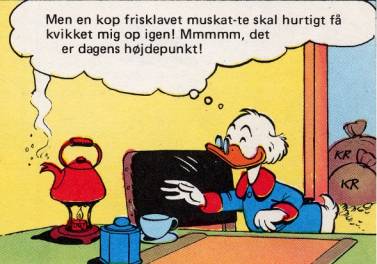
All
very innocent. Or is it? Seconds later, when Scrooge realises, that his supply
of nutmeg tea has run out, and - even worse - his supplier has cut him off, the
scenery immediately turns quite ugly.
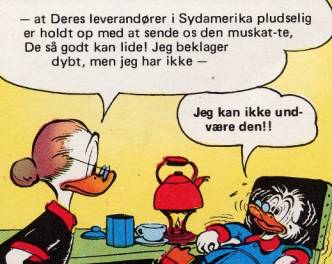
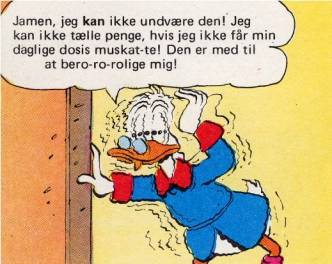
Scrooge
is evidently hooked on the stuff! He cannot do without it. Scrooge’s
extraordinary ability of making money, and hence the basis of the entire McDuck
Empire, seems dangerously close linked with his usage of nutmeg.
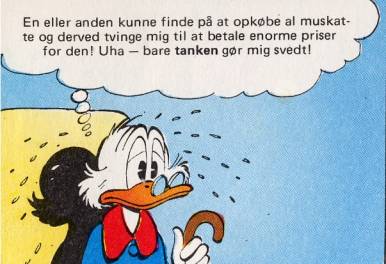
Apparently, Scrooge McDuck sees no moral problem with his unhealthy use of drugs. As shown, he feels no shame about it - only fear of being exploited - but what is even worse, he does not think twice about passing his filthy habit on to his young relatives. Even though he is aware of what the use of nutmeg has done to himself.

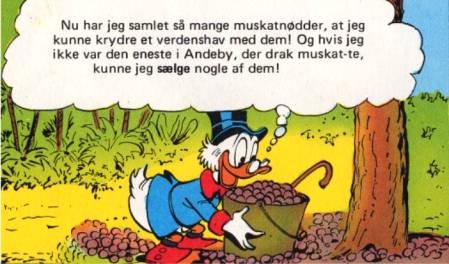
In fact, as the idea of introducing nutmeg in Duckburg came to Scrooge in a Barksian documentary from 1962, and the first known case of Donald’s sad addiction to Gurgleurp® was reported in 1964, it is not at all difficult to imagine, who might be the manufacturer of this effectively commercialised and habituative soft-drink product in Duckburg. Nor should it any longer be a mystery, what the secret ingredient of Gurgleurp® is.
So, Donald Duck does not, in more than one sense of the term, have his habit from strangers. Not only is he sharing it with his Uncle Scrooge. The nice uncle might even prove to be the one responsible for and profiting by his nephew’s drug addiction! And, hence of his repetitive fainting. It is running in the family, just like the drugs. Quack, indeed!
Anvendte
kildeforkortelser (fremkommer ved at placere cursoren på billedet):
AA
: Anders And & Co.
DSAA
: Den Store Anders And
JB
: Jumbo-Bøger
TL
: Topolini (Libretto)
US
: Uncle Scrooge
WDC
: Walt Disney’s Comics & Stories
Refereret
litteratur:
Sydnordisk Akademi for Donaldisme henleder opmærksomheden på, at rettighederne til (næsten) alle de anvendte billeder på Akademiets sider tilhører ©Disney, der i Danmark er repræsenteret ved Egmont Serieforlaget A/S. Billedmaterialet må ikke anvendes i erhvervsmæssigt øjemed.